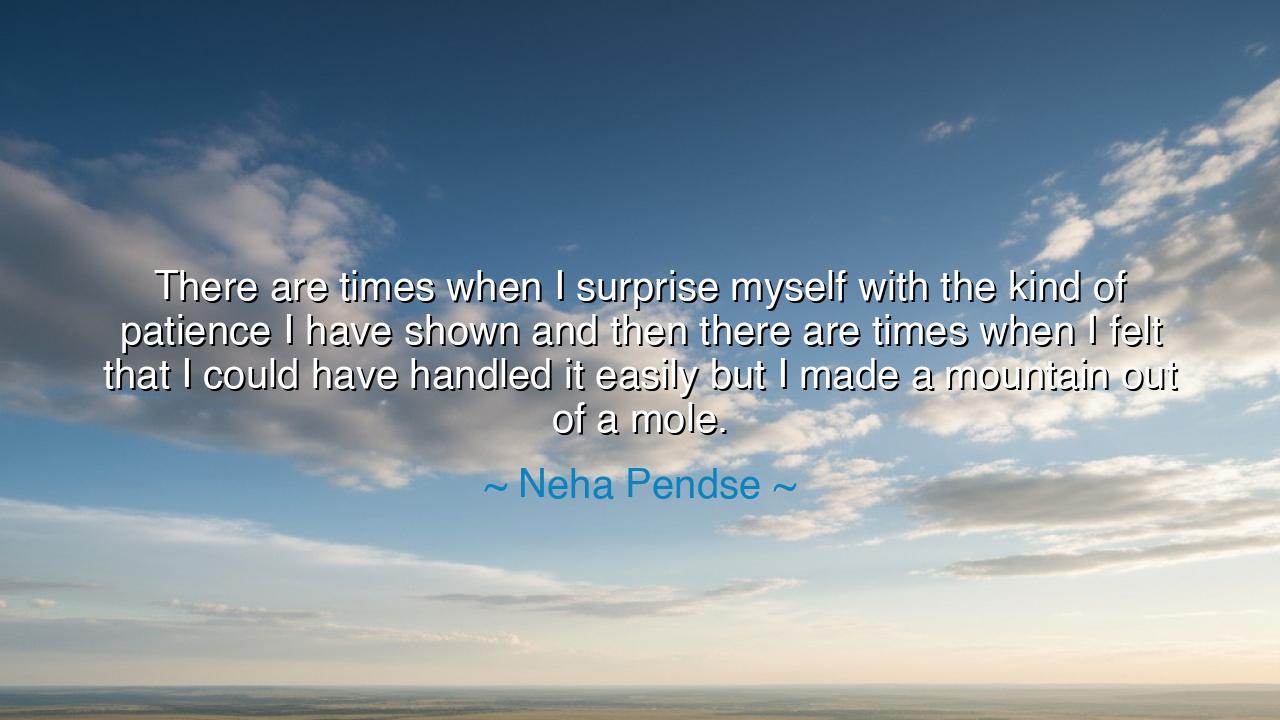
There are times when I surprise myself with the kind of patience
There are times when I surprise myself with the kind of patience I have shown and then there are times when I felt that I could have handled it easily but I made a mountain out of a mole.






Hear the words of Neha Pendse, who speaks with the honesty of one who has walked through both triumph and trial: “There are times when I surprise myself with the kind of patience I have shown and then there are times when I felt that I could have handled it easily but I made a mountain out of a mole.” In this simple utterance lies a reflection that belongs to all of humanity, for each soul has known moments of strength beyond expectation, and moments of weakness where trifles seemed as storms. She speaks to the duality within us all—the capacity for calm endurance, and the folly of magnifying what is small.
The heart of her confession lies in patience, that rare jewel which shines brightest in moments of trial. Sometimes it is hidden deep within, and when drawn forth, it astonishes even ourselves. Who has not endured grief, insult, or delay, and afterward wondered, How did I survive with such calm? It is in these moments that the human spirit shows its nobility. Yet just as often, the same spirit falters at the smallest provocation. What could have been handled with ease becomes turmoil, and what was but a molehill becomes, through our impatience, a mountain impossible to climb.
The ancients knew this truth well. Marcus Aurelius, emperor and Stoic, wrote in his Meditations that men are more troubled by their judgments of events than by the events themselves. A spilled cup of wine, a careless word, a delay in plans—all these are but molehills. Yet the mind, if undisciplined, makes them mountains of rage and sorrow. Pendse’s words echo this same wisdom: that mastery of the self is not constant, but fluctuates, and that awareness of this fluctuation is itself a form of growth.
Consider, too, the story of Abraham Lincoln. Throughout his life, he bore immense burdens with remarkable patience—the agony of civil war, the hatred of rivals, the grief of personal loss. Yet there are accounts of him also losing his temper at minor slights, later regretting that he let small matters disturb his composure. He, like Pendse, embodied the paradox of humanity: great patience in great trials, yet weakness in the trivial. It is not perfection that defines us, but the striving to learn from both extremes.
There is wisdom in acknowledging both sides of ourselves. To admit that we sometimes exaggerate our struggles is to confess our humanity. To marvel at our hidden reservoirs of patience is to honor the resilience of our spirit. Pendse’s reflection is thus both humble and noble: humble in admitting her faults, noble in recognizing her strength. It teaches us that the journey to self-mastery is not about never stumbling, but about learning with each stumble where we might walk more steadily next time.
The lesson, O seekers, is this: guard against the making of mountains from moles. When faced with small inconveniences, pause, breathe, and see them for what they are. Do not let trifles steal your peace. At the same time, cherish and nurture the patience that surprises you in greater trials, for it is proof that your spirit is stronger than you know. The one who can be calm in storms but also calm in drizzle is the one who has truly mastered the art of living.
Practical counsel is clear: practice awareness in the small things. When you feel anger rise, ask yourself if the matter deserves the mountain you are building. When you endure with grace, take note and give thanks, for you have discovered a hidden strength within. Over time, such mindfulness will make your patience less a surprise and more a steady companion.
So let Neha Pendse’s words stand as both mirror and guide: “Sometimes I surprise myself, sometimes I make a mountain out of a mole.” This is the rhythm of being human. Learn from both, grow from both, and you will one day find that the molehills no longer grow into mountains, and the mountains themselves become paths you can cross with quiet strength.






AAdministratorAdministrator
Welcome, honored guests. Please leave a comment, we will respond soon